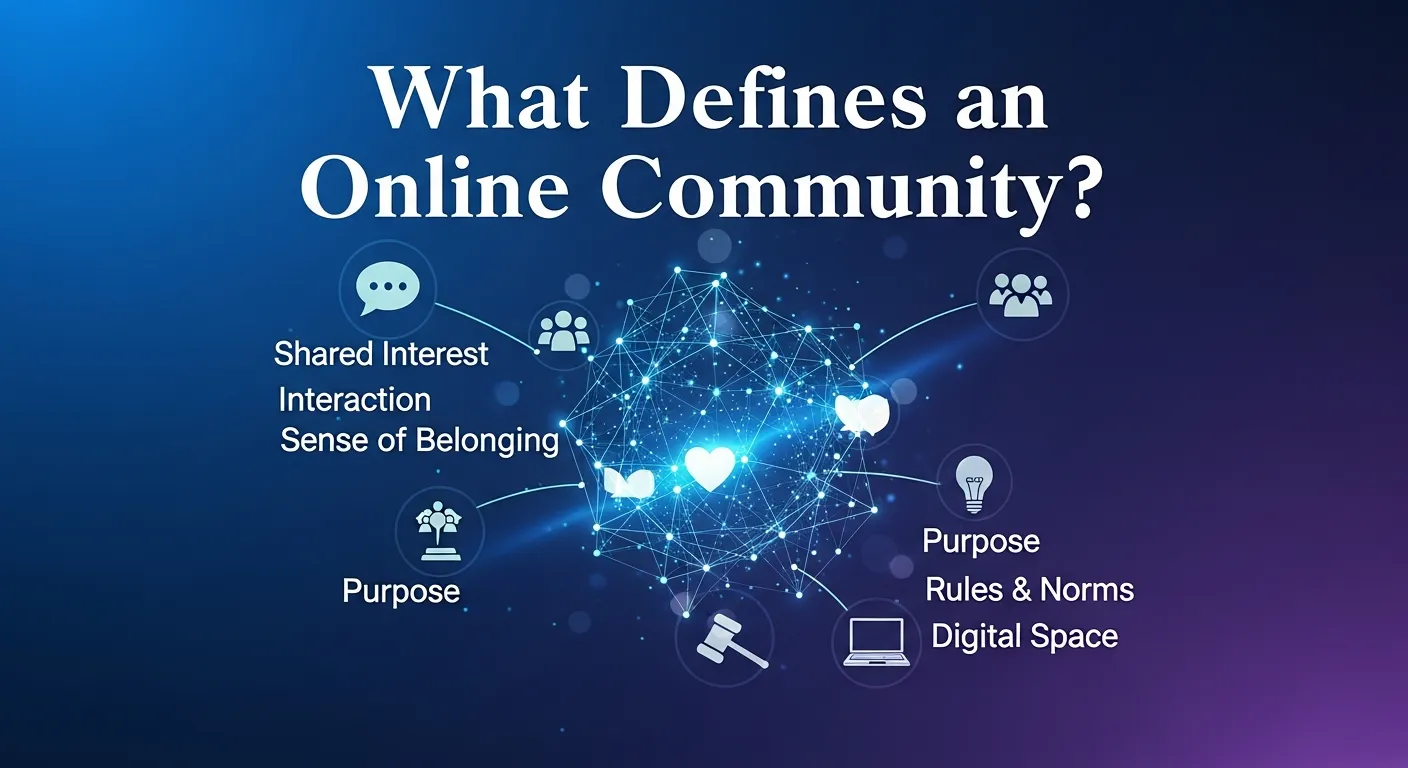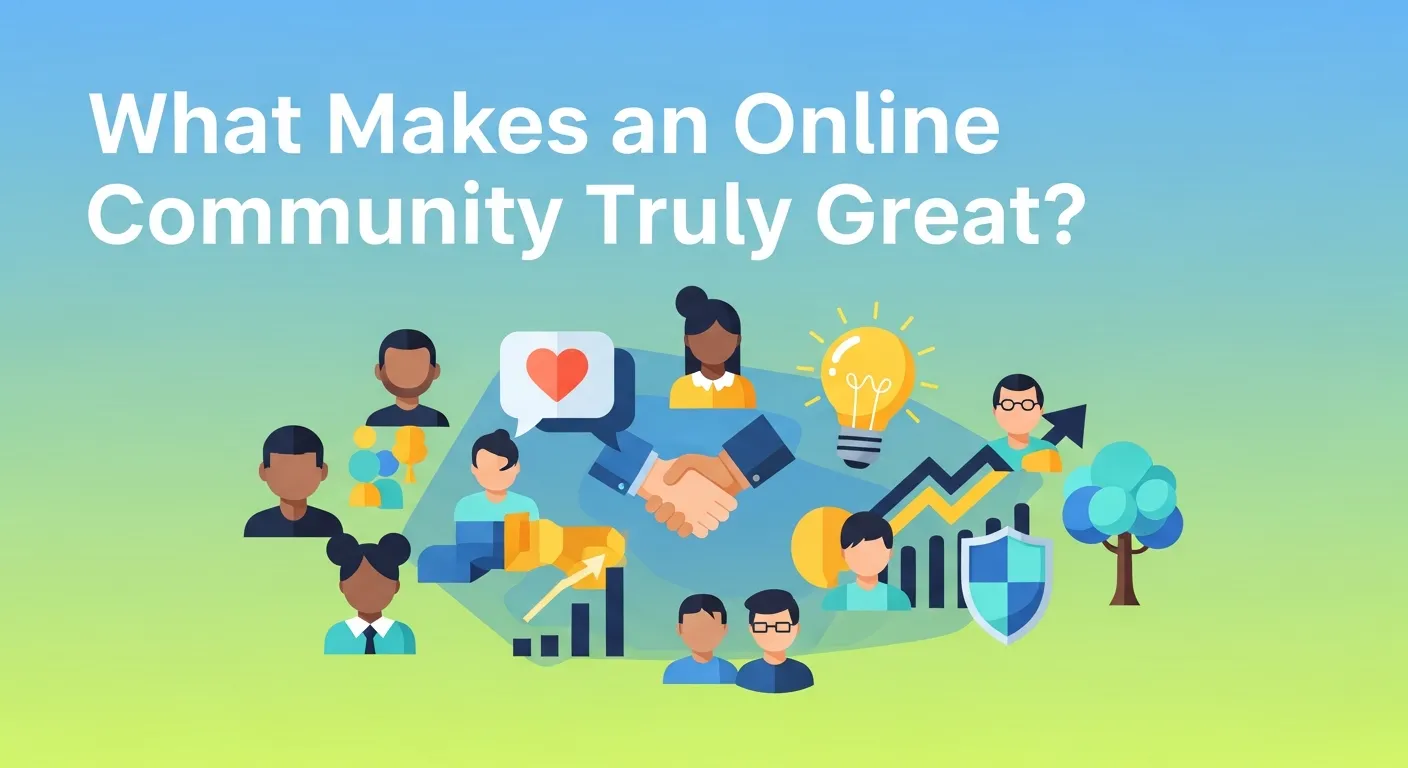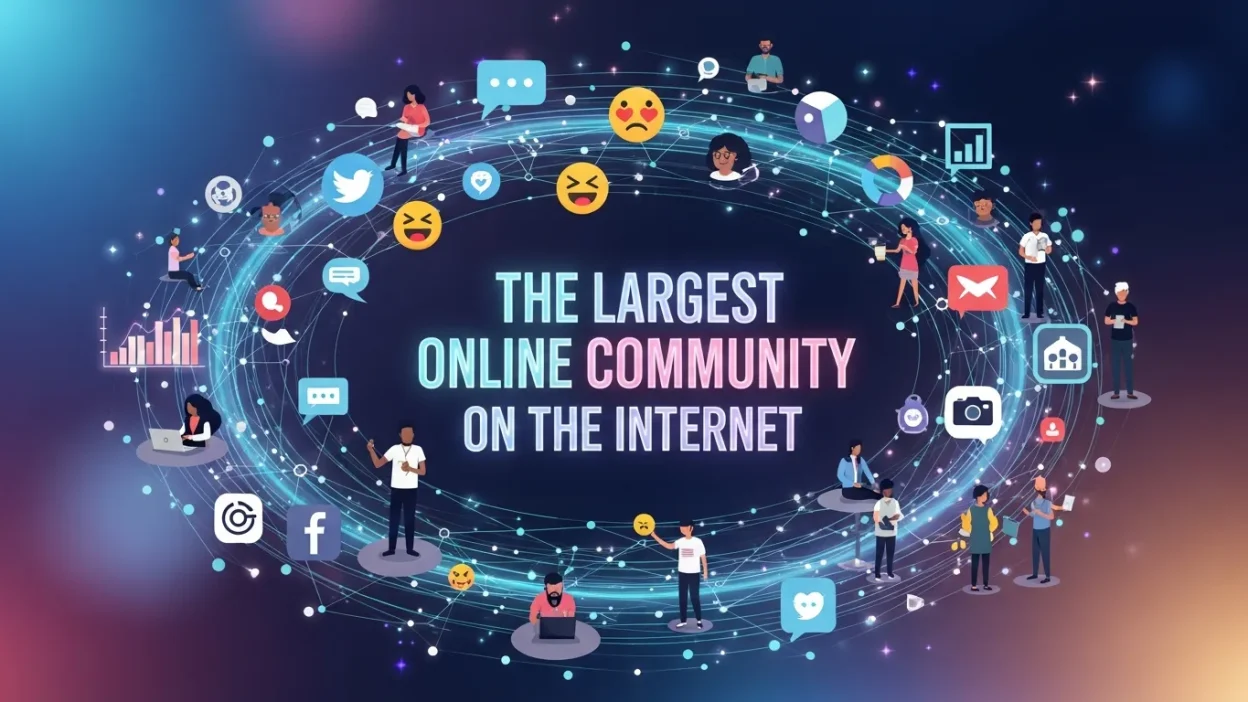The Internet has transformed the way people connect, creating vast online communities on the Internet where individuals can interact, share knowledge, and collaborate regardless of location. These communities range from social networks like Facebook to content platforms like YouTube and TikTok, niche forums like Reddit, and interactive gaming networks. Each type provides opportunities for belonging, learning, and collaboration. While size matters, engagement, inclusivity, and shared purpose are what truly define a thriving online community.
The Internet has brought people together in ways once unimaginable. From niche interest groups to global movements, it is the ultimate platform for community-building. But amidst the vast landscape of online forums, social media platforms, streaming services, and other digital hubs, one question stands out: What is the largest online community on the Internet?
This post dives deep into the world of online communities, exploring the contenders for the title of “largest community,” their unique characteristics, and why they hold such tremendous appeal. Whether you’re a keen observer of digital culture or a participant in these spaces, this guide will illuminate the ways in which online communities shape our interconnected world.
What Defines an Online Community?

Before identifying the largest online community, it’s essential to understand what an online community entails. At its core, an online community is a group of individuals who interact with one another via the Internet, usually centered around shared interests, digital detox, goals, or identities. These communities foster connection, exchange ideas, and often create a sense of belonging among members.
Features of Online Communities
- Shared Interest or Purpose: Whether it’s technology, hobbies, gaming, or activism, successful online communities thrive on a common thread that unites their members.
- Interactivity: Online communities revolve around engagement, such as commenting, posting, and collaborating.
- Platform or Location: A dedicated space like a forum, Social Media Community page, or messaging app is often central to interaction.
With these features in mind, let’s explore the reigning giants of the Internet to see who might hold the crown of the largest community.
Why Online Communities on the Internet Matter
Understanding an online community on the Internet goes far beyond measuring user numbers or platform size. What truly matters is the depth of human connection, mutual support, and shared experiences these digital spaces create. Online communities play a powerful role in shaping how people interact, learn, and grow in the digital age.
Online communities foster a sense of belonging by connecting individuals with like-minded people, regardless of geographical location. For many, these communities become safe spaces where they feel understood, accepted, and valued.
They also enable knowledge sharing, allowing members to exchange ideas, tips, resources, and real-life experiences. From professional advice to personal interests, online communities act as collective knowledge hubs.
Another key benefit is collaboration. Members often come together to work on creative projects, organize events, support social causes, or solve common problems. This collaborative spirit strengthens trust and long-term engagement within the community.
Additionally, online communities support emotional well-being. Many people find empathy, encouragement, mentorship, and friendship through digital interactions, helping reduce loneliness and build confidence in an increasingly connected world.
Overall, an online community on the Internet is not just a digital gathering place—it is a meaningful ecosystem that nurtures connection, learning, collaboration, and emotional support across borders and cultures.
Top Contenders for the Largest Online Community
While there’s no single way to measure the size of an online community, factors like user base, engagement levels, and reach provide useful indicators. Below are some of the most prominent contenders:
1. Facebook
Facebook, founded in 2004, is often hailed as the undisputed giant of online social platforms. With nearly 3 billion monthly active users, it connects people across nations, languages, and cultures.
Why It Stands Out
- Global Connectivity: Facebook caters to a global audience, enabling connections between family, friends, and colleagues worldwide.
- Variety of Interests: From groups dedicated to local community news to specialized niches like antique restoration or dog training, Facebook offers something for virtually everyone.
- Tools for Communities: Features like Facebook Groups, Events, and Marketplace foster interactivity and keep users engaged beyond personal connections.
Yet, while Facebook’s scale is unparalleled, its generalist nature means it lacks the intimate focus of smaller or more interest-driven communities.
2. YouTube
Is YouTube a community? The simple answer is yes. With 2.5 billion logged-in monthly users, YouTube is as much about community as it is about content. Creators and audiences alike engage over tutorials, vlogs, music, and more.
Why It Stands Out
- Creator-Centric: Subscribers form deeply loyal fanbases for creators, while comment sections act as interactive spaces.
- Range of Content: Whether you’re into ASMR, home improvement, or history documentaries, YouTube has something for everyone.
- Global Accessibility: YouTube’s video platform transcends language barriers with subtitles, translation tools, and a vast international creator base.
YouTube communities often center around individual content creators and their followers rather than encompassing the overarching platform in its entirety.
3. Reddit
Reddit brands itself as “the front page of the Internet,” and with good reason. With over 430 million monthly active users, Reddit is a hub for thousands of communities, or “subreddits,” focused on specific topics.
Why It Stands Out
- True Diversity: Subreddits cover every imaginable topic, from r/AskReddit and r/WritingPrompts to r/Cooking and r/WholesomeMemes.
- Anonymity & Openness: Many users feel free to express themselves candidly without fear of judgment.
- Crowdsourced Knowledge: The upvote system gives visibility to the most helpful, insightful, and entertaining content.
While it doesn’t have the same user base as Facebook or YouTube, its engagement levels are unmatched in terms of niche interests and passion-driven discussions.
4. TikTok
TikTok might not be the first platform you think of as a “community,” but with over 1 billion monthly active users, it’s one of the most dynamic digital spaces. TikTok inspires collaboration through trends, challenges, and stitched video responses.
Why It Stands Out
- Trend Culture: Trends like viral dances or recipes bring millions of users together in shared experiences.
- Inclusive Content Creation: TikTok’s short-form content encourages everyone to participate, regardless of technical expertise.
- Subcultures: TikTok thrives on micro-communities, uniting fans of specific aesthetics, genres, or shared experiences (like #BookTok or #Cottagecore).
Its high engagement rates and collaborative nature make TikTok a strong contender as one of the most active communities online.
5. Gaming Communities
From Fortnite to Minecraft to gaming forums on Discord, online gaming communities have millions of members who interact in real time. Platforms like Steam and Twitch further expand players’ ability to connect and collaborate.
Why They Stand Out
- Real-Time Interaction: Online multiplayer games foster instant connection and teamwork.
- Long-Term Loyalty: Franchises like “World of Warcraft” or “League of Legends” have die-hard fanbases that continue to engage over years.
- Collaborative Platforms: Voice chat apps like Discord augment in-game interaction with spaces to strategize, chat, and bond.
Gaming communities are some of the most engaged users online, often forming lasting friendships over shared virtual experiences.
Key Types of Online Communities
Online communities take different forms depending on their focus, interactivity, and platform. Some of the most common types include:
-
Social Networking Communities: Facebook, LinkedIn, and Instagram, which connect people broadly.
-
Content-Creation Communities: YouTube, TikTok, and blogging platforms where creators and audiences interact.
-
Interest-Based Communities: Reddit, hobby forums, and Discord servers centered on specific passions.
-
Gaming Communities: Multiplayer games, Steam groups, and Twitch channels that enable real-time collaboration.
Comparison of Major Online Communities on the Internet
| Community Type | Platform Examples | Key Features | User Base |
|---|---|---|---|
| Social Networking | Facebook, LinkedIn | Groups, Events, Messaging | ~3B |
| Content-Creation | YouTube, TikTok | Videos, Comments, Subscriptions | 1–2.5B |
| Interest-Based | Reddit, Discord | Forums, Sub-communities, Upvotes | 430M+ |
| Gaming | Fortnite, Minecraft, Twitch | Multiplayer, Voice Chat, Streaming | 100M+ |
What Makes an Online Community Truly Great?

Size alone isn’t the sole factor in ranking internet communities. A truly remarkable community combines several qualitative aspects alongside its user base:
- Engagement: High levels of interactivity, such as active participants in forums, videos, and discussions, demonstrate a thriving community.
- Inclusivity: Communities should welcome diverse opinions and demographics while minimizing toxic behavior.
- Shared Purpose: The best online communities share a unifying goal, passion, or interest.
How to Engage Effectively in an Online Community on the Internet
Being part of a large online community isn’t just about joining—it’s about meaningful participation. Consider these strategies:
- Actively Participate: Comment, post, and share content regularly to build visibility.
- Respect Community Rules: Adhere to guidelines to maintain positive interactions.
- Connect with Like-Minded Members: Seek subgroups or threads aligned with your interests.
- Share Knowledge and Resources: Contribute tips, advice, or expertise to help others.
- Balance Online Time: Engage without overextending to maintain healthy digital habits.
Facebook Is Huge, but the Title Depends on Context
Returning to our original question, Facebook claims the largest community in terms of raw user numbers. No other platform comes close to its billions of active users. However, the title of “largest community” may shift based on how we define size and impact:
- Reddit fosters the most diverse range of niche topics.
- YouTube and TikTok engage users through creators and shared cultural moments.
- Gaming platforms deliver unique interactivity and collaboration not seen elsewhere.
Ultimately, choosing the “largest” community depends on whether you’re looking at metrics like total users, engagement levels, or shared purpose.
Join the Conversation
Are you ready to deep-dive into one of these massive online communities? Explore the platform (or platforms!) that suit your passions and see what draws billions of users together every day.
And don’t forget to share your favorite community in the comments below. Who knows? You might help someone find their next great connection!
Future of Online Communities on the Internet

The growth of online communities shows no signs of slowing down. Emerging trends include:
- Niche Micro-Communities: Smaller, highly focused groups fostering deeper engagement.
- Virtual Reality Spaces: VR communities where users interact in immersive digital environments.
- AI-Powered Personalization: Platforms recommending communities and content tailored to individual interests.
- Cross-Platform Collaboration: Communities expanding beyond a single platform to integrate forums, video, and social networks.
Conclusion
Online communities on the Internet are more than just large user bases—they are ecosystems of shared interests, collaboration, and meaningful connection. Whether it’s learning from others, participating in global discussions, or joining niche subcultures, these communities provide a sense of belonging and empower individuals worldwide. As digital platforms continue to evolve, engaging actively and respectfully ensures that you gain the most value from these spaces. By participating thoughtfully, you can contribute to, and benefit from, some of the most dynamic communities the Internet has to offer.
FAQs on Online Community on the Internet
1. What is an online community on the Internet?
An online community on the Internet is a virtual space where people with shared interests, goals, or identities interact, collaborate, and communicate through forums, social media platforms, apps, or gaming networks.
2. Why are online communities important?
They foster connection, knowledge sharing, collaboration, and emotional support. Online communities help people feel a sense of belonging and build relationships beyond geographical boundaries.
3. Which platforms host the largest online communities on the Internet?
Platforms such as Facebook, YouTube, Reddit, TikTok, and gaming networks like Fortnite, Minecraft, and Discord host some of the largest online communities globally.
4. What makes an online community successful?
A successful online community combines high engagement, inclusivity, a shared purpose, and supportive interactions where members feel valued and respected.
5. Can joining an online community improve personal growth?
Yes. Active participation helps members gain knowledge, develop new skills, broaden perspectives, enhance creativity, and build meaningful personal and professional relationships.
6. Are online communities only for social interaction?
No. Online communities also support learning, professional networking, collaboration, activism, and mental well-being.
7. How can I engage effectively in an online community on the Internet?
Effective engagement includes posting and commenting regularly, following community rules, connecting with like-minded members, sharing useful resources, and maintaining a healthy balance of online time.
8. Do online communities impact mental well-being?
Yes. They can reduce isolation, provide emotional support, boost confidence, and offer safe spaces for self-expression, positively affecting mental health.
9. Are online communities safe?
Most communities have moderation systems and guidelines, but users should practice digital safety, protect personal information, and engage responsibly.
10. Can businesses benefit from online communities on the Internet?
Absolutely. Businesses use online communities for customer engagement, feedback, support, brand building, and market research.
11. How do niche communities differ from larger platforms?
Niche communities focus on specific interests, offering deeper engagement, more meaningful discussions, and stronger connections than broad platforms with massive audiences.
12. What is the future of online communities on the Internet?
The future includes micro-communities, Virtual Reality (VR) spaces, AI-powered personalization, and cross-platform integration for more immersive and tailored engagement.





